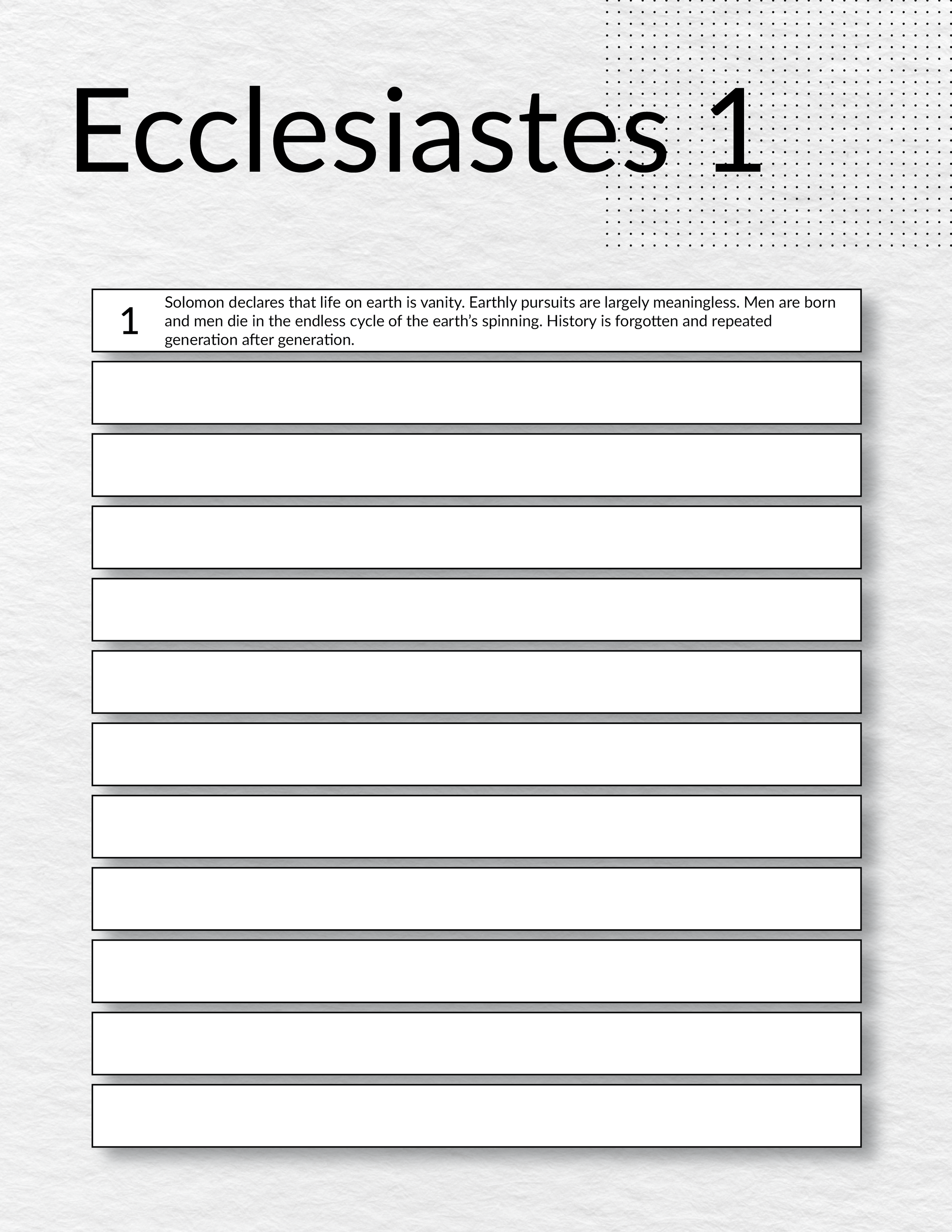Ecclesiastes 1 Summary - 5 Minute Bible Study
Ecclesiastes 1 Short Summary:
Solomon declares that life on earth is vanity. Earthly pursuits are largely meaningless. Men are born and men die in the endless cycle of the earth’s spinning. History is forgotten and repeated generation after generation.
Ecclesiastes 1 Bible Study
ECCLESIASTES CHAPTER SUMMARIES
Ecclesiastes 1 - Solomon declares that life on earth is vanity. Earthly pursuits are largely meaningless. Men are born and men die in the endless cycle of the earth’s spinning. History is forgotten and repeated generation after generation.
AUTHOR:
Ecclesiastes was almost certainly written by Solomon (Ecc 1:1), the son of David, the 3rd king of the United Kingdom of Israel and Judah.
His palace and the Temple of God were located in Jerusalem.
Solomon became king in approximately 1015 B.C and reigned for 40 years.
OUTLINE:
INTRODUCTION (1:1):
Ecclesiastes was written by Solomon, the son of David, the 3rd king of the United Kingdom of Israel and Judah.
His palace and the Temple of God were located in Jerusalem.
Solomon became king in approximately 1015 B.C and reigned for 40 years.
THE VAIN CIRCLE OF LIFE (1:2-11):
Solomon begins the book by declaring that all of life is vanity.
A man works his whole life and what does he gain in the end? What does he get to take with him into the grave.
A generation is born and dies, and they are immediately replaced by another in a never-ending cycle.
The sun rises, sets, and then preps itself to rise again the next day.
The wind blows but never exhausts.
The rivers run into the seas, but the rivers never run dry and the seas never overflow.
No matter how many wonderful things a man sees or hears, it never brings him to a place of perfect satisfaction.
People in the present forget the past, and it will forever be that way.
What was done in the past will be repeated, because there is “nothing new under the sun” (1:10).
ACQUIRING WISDOM FOR ITS OWN SAKE IS VANITY (1:12-18):
Solomon had set his mind to acquiring wisdom, and these were some of the conclusions he reached.
God had placed humans in this revolving world, and human wisdom declared it to be an endless cycle of vanity.
From a purely physical and human perspective, everything that people set their minds to accomplish is empty and shockingly temporary.
A common phrase in Ecclesiastes to describe the vanity of life is “striving after wind.” Trying to find meaning and satisfaction in life without God is as impossible as catching the wind. Solomon had tried it, and this book is about his failure.
Even the possession of great wisdom to know this truth couldn’t satisfy a person. Solomon had been given the gift of wisdom by God, and even his supernatural wisdom wasn’t able to figure out out to squeeze meaning out of the repetitive days of life.
His wisdom had only led him to confidence in the vanity of life, and his great knowledge resulted in frustration and sorrow instead of peace.
APPLICATION
Towards the end of the book, Solomon will make some statements that make it clear that what he is talking about in these early chapters is the vanity of life apart from God.
But it’s interesting that Solomon says God has assigned this vain work to men in Ecclesiastes 1:13.
Why would God put men in a world where they can never be fully satisfied? Is that cruel?
There is a quote that gives us the answer to this question. I don’t know who to attribute the quote to, but it goes something like this, “God has created each of us with a piece of our heart missing, a piece that we cannot find on earth, but that we can only find in Him.”
It seems very likely that God put men in a world of revolving vanity in order to help them realize that no lifestyle, no pleasure, no accomplishment, no relationship, no power, and no earthly feeling will complete them.
God never intended for us to be content with the earth. He never wanted us to make this place our home and to declare our souls satisfied with its small but temporal joys.
He wants us to search out what our souls are craving, something lasting, and something more glorious.
We can find contentment on earth, but only when God is within our hearts.
The earth rotates, the planets revolve, and the hands of the clock refuse to stop ticking round and around. What exists outside of this endless cycle of cosmic repetition?
Only the One who created it, the One who is and who was and who is to come (Rev 1:8)! The only escape out of the vanity is God resurrecting you out of the endless cycle and into His eternal presence.

